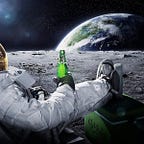The Assassination of the Root of Astrology
The human race has always wanted to control the future, or at least to predict what will happen. That is why astrology is so popular. What is all this astrology business? Basically, it is the contention that the constellations of the planets at the moment of your birth profoundly influence your future. It is a mixture of careful observations, mathematics, and record-keeping with fuzzy thinking and pious fraud. Nevertheless, astrology survived and flourished. Why? Because it seems to lend a cosmic significance to our daily lives. It pretends to satisfactory our longing to feel personally connected with the universe. Astrology suggests a dangerous fatalism which kills your free will.
Astrology is fundamentally deterministic and the majority of astrologers approach the subject with a more or less deterministic mindset, whether they consciously acknowledge it or not. In fact, the vast majority of astrologers seldom even realize just how deterministic their unspoken assumptions about astrology actually are, and these assumptions are in conflict with their consciously stated views about the subject.
Determinism is the philosophical belief that every event or action is the inevitable result of proceeding events and actions. Thus, in principle at least, every event or action can be completely predicted in advance, or in retrospect. The person most closely associated with the establishment of determinism at the core of modern science is Isaac Newton, who lived in England about 300 years ago.
Newtonian determinism says that the universe is a clock. A gigantic clock that’s wound up in the beginning of time, and it’s been ticking ever since according to Newton’s laws of motion. Newton’s laws are completely deterministic because they imply that anything that happens at any future time is completed determined by what happens now, and moreover that everything now was completely determined by what was happened at any time in the past. So, what you are going to eat ten years from now on January first has already been fixed. It’s already known using Newton’s laws of motion.
Einstein believed in that. Einstein was a determinist. Does that mean that a murderer, this horrible mass murderer isn’t really guilt of his works because he was already pre-ordained billions of years ago? Einstein says well yes, in some sense that’s true. Even mass murderers were predetermined. But he said, they should still be placed in jail. Heisenberg then comes along the proposes Heisenberg Uncertainty Principle and says nonsense. There is uncertainty. You don’t know where the electron is. It could be here or many places simultaneously. This of course Einstein hated because he said god doesn’t play dice with the universe. Well, get used to it. Einstein was wrong. God does play dice. Every-time we look at an electron it moves, there’s uncertainty with regards to the position of the electron. So, what does it mean for free will? It means in some sense we do have some kind of free will. No one can determine your future events given your past history. There is always wild card. There is always the possibility of uncertainty in whatever we do.
“If our lives controlled by a set of traffic signals in the sky, why try to change anything” Through this quote Carl Sagan confronts astrology by pointing out its false determinism. Believing blindly in astrology is not good for our morals either, as it can only lead to an apathy and a passive stance towards our existence.
There is not statistical correlation in astrology, as two twins born in the same place and within minutes of each other could have different dispositions and lives, even though exactly the same planets would be rising at their births. If astrology were valid, how could they have profoundly different fates? It turns out astrology can’t even agree among themselves what a given horoscope means. In careful tests they are unable to predict the character and future of people they know nothing about except the time and place of birth. However, wisely enough, they make their forecasts so vague that they can apply to any outcome. Statements such as “Personal relations may become intense” or “You will have a financially rewarding opportunity” can never be proved wrong.
“Watch out for wormholes: you never know what may come out of them.”
Even Stephen Hawking wasn’t sure if “the world is safe and predictable or not.” So how can the rest of us be confident that our pea-brains can figure it all out? I welcome discussion, polite debate, and scientific updates or clarifications in the comment section.
